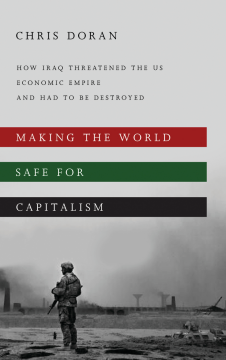
Additional Information
Book Details
Abstract
The Iraq war defined the first decade of the twenty-first century – leading to mass protests and raising profound questions about domestic politics and the use of military force. Yet most explanations of the war have a narrow focus either on political personalities or oil.
Christopher Doran provides a unique perspective, arguing that the drive to war came from the threat Iraq might pose to American economic hegemony if the UN sanctions regime was ended. Doran argues that this hegemony is rooted in third world debt and corporate market access. It was protection of these arrangements that motivated US action, not Iraq’s alleged weapons of mass destruction or a simplistic desire to seize its oil.
This book will provide new insights on the war which still casts a shadow over global politics, and will have wide appeal to all those concerned about the Middle East, world peace and global development.
'Doran's book provides a fresh and unconventional perspective on the origins of the war in Iraq and with it thought-provoking insights into the motivations of the US government when it invaded Iraq'
Sharon Beder, author of Free Market Missionaries and Suiting Themselves: How Corporations Drive the Corporate Agenda.
'A significant contribution to the scholarly literatures on neoliberalism and the US intervention in lraq. Insightful and compelling'
David McNally, York University, author of Global Slump: The Economics and Politics of Crisis and Resistance
'Doran pulls no punches in revealing the abuses of corporate and state power. This is a powerful account of how the expansion of the 'market economy' into unwelcoming territory is driven by an iron fist'
Frank Stilwell, Professor of Political Economy, University of Sydney
Table of Contents
| Section Title | Page | Action | Price |
|---|---|---|---|
| Cover | Cover | ||
| Contents | vii | ||
| Part I. Making Sense of the Invasionand Occupation of Iraq | 1 | ||
| 1. Introduction: Making Sense of Iraq | 3 | ||
| 2. Iraq: A Devastated Country | 13 | ||
| 3. A Full-Scale Economic Overhaul:The Rise of Free Market Neoliberalism | 18 | ||
| 4. Chile and the Blueprint for Iraq | 27 | ||
| Part II. Iraq’s Potential Threat to Saudi Arabiaas a US Client State | 35 | ||
| 5. Nixon, Saudi Arabia and theGeopolitical Roots of the Iraq Invasion | 37 | ||
| 6. Petrodollar Recycling, Third WorldDebt and the Washington Consensus | 43 | ||
| 7. Neoliberalism, Debt and AmericanEmpire | 51 | ||
| 8. Containing Iraq: The Gulf War andSanctions | 59 | ||
| Part III. Dollar Dominance:Controlling the Dollar, Controlling Iraq | 69 | ||
| 9. Threat to the Dollar: Iraq, the Euroand Dollar Dominance | 71 | ||
| 10. Dollar Challenge Redux:The Global Financial Crisis and Iraqi Oil | 79 | ||
| 11. Containing Iraq: Oil, Imperialismand the Rise of Corporate Rule | 86 | ||
| 12. Iraq: Resistance and Revolution | 96 | ||
| Part IV. Losing Out: The US Eliminated fromOil and Other Iraqi Markets PostSanctions | 105 | ||
| 13. State of Play: Neoliberalism Wounded,US Hegemony Challenged | 107 | ||
| 14. Losing Out: The GeopoliticalSignificance of Iraq’s Oil | 116 | ||
| 15. The Push for War | 123 | ||
| 16. Invading Iraq:Bush’s Agenda from Day One | 129 | ||
| Part V. Regime Change:Opportunity to Create a Brand New,Neoliberal, Free Market State | 135 | ||
| 17. Regime Change:The Bremer Economic Orders | 137 | ||
| 18. Reconstruction and Corruption:The Next Klondike | 147 | ||
| 19. Reconstruction and Corruption:The Halliburton and Bechtel Contracts | 154 | ||
| 20. Locking Down Iraq: Post Sovereignty | 160 | ||
| 21. Iraqi Oil: A New and Improved SaudiArabia for the Twenty-first Century | 167 | ||
| Part VI. Expanding the Empire: A NeoliberalFree Trade Area for the Middle East | 175 | ||
| 22.The US Middle East Free Trade Area | 177 | ||
| 23. Case Studies: Jordan and Morocco | 185 | ||
| 24. Case Studies: Oman and Bahrain | 192 | ||
| 25. Egypt and How to Make a Fortunefrom Hunger and Misery | 199 | ||
| Part VII. Sowing the Seeds of Democracy:A Case Study of Iraqi Agriculture | 209 | ||
| 26. Neoliberal Authority: Iraqi Agriculture | 211 | ||
| 27. Order 81 and the Genetically ModifiedSeeds of Democracy | 216 | ||
| 28. Seeds in the Ground | 223 | ||
| 29. Hunger and Misery:A Profitable Occupation | 229 | ||
| Part VIII. Conclusion: Iraq and the CorporateCapture of the Democratic State | 235 | ||
| 30. The Corporate Capture ofthe Democratic State | 237 | ||
| Notes | 249 | ||
| Index | 275 |
